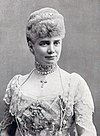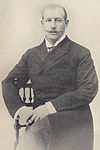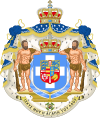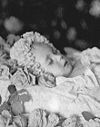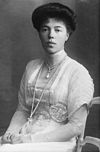Descendants of Christian IX of Denmark: Difference between revisions
Full names in lead. Tags: Mobile edit Mobile web edit Advanced mobile edit |
Grammar. Tags: Mobile edit Mobile web edit Advanced mobile edit |
||
| Line 6: | Line 6: | ||
[[File:Christian IX of Denmark with family (Tuxen).jpg|thumb|alt=An image of King Christian IX and Queen Louise of Denmark with their descendants|Christian IX with various children and grandchildren at [[Fredensborg Palace]]. Specific subjects are identified [[The Family of Christian IX of Denmark#People seen in the picture|here]].]] |
[[File:Christian IX of Denmark with family (Tuxen).jpg|thumb|alt=An image of King Christian IX and Queen Louise of Denmark with their descendants|Christian IX with various children and grandchildren at [[Fredensborg Palace]]. Specific subjects are identified [[The Family of Christian IX of Denmark#People seen in the picture|here]].]] |
||
[[Christian IX of Denmark]] (April 8, 1918{{snd}}January 29, 1906) ruled [[Danish Realm|Denmark]] from 1863 to 1906. Known as the "[[father-in-law of Europe]]",<ref name="C9RoyalPalaces">{{Cite web |url=https://kongeligeslotte.dk/en/explore-history/christian-IX.html |title=Christian IX |website=Royal Palaces |publisher=National Museum of Denmark |access-date=March 6, 2024}}</ref> he and his wife [[Louise of Hesse-Kassel]] (September 7, 1817{{snd}}September 29, 1898) became the ancestors of many members of European royalty. Some of these descendants would play a role in the history of several European countries, including [[Kingdom of Greece|Greece]], [[Russian Empire|Russia]], and the [[United Kingdom]]. This article describes the children, grandchildren, and great-grandchildren of Christian and Louise. |
[[Christian IX of Denmark]] (April 8, 1918{{snd}}January 29, 1906) ruled [[Danish Realm|Denmark]] from 1863 to 1906. Known as the "[[father-in-law of Europe]]",<ref name="C9RoyalPalaces">{{Cite web |url=https://kongeligeslotte.dk/en/explore-history/christian-IX.html |title=Christian IX |website=Royal Palaces |publisher=National Museum of Denmark |access-date=March 6, 2024}}</ref> he and his wife, [[Louise of Hesse-Kassel]] (September 7, 1817{{snd}}September 29, 1898), became the ancestors of many members of European royalty. Some of these descendants would play a role in the history of several European countries, including [[Kingdom of Greece|Greece]], [[Russian Empire|Russia]], and the [[United Kingdom]]. This article describes the children, grandchildren, and great-grandchildren of Christian and Louise. |
||
{{Clear}} |
{{Clear}} |
||
Revision as of 04:58, 11 April 2024

Christian IX of Denmark (April 8, 1918 – January 29, 1906) ruled Denmark from 1863 to 1906. Known as the "father-in-law of Europe",[1] he and his wife, Louise of Hesse-Kassel (September 7, 1817 – September 29, 1898), became the ancestors of many members of European royalty. Some of these descendants would play a role in the history of several European countries, including Greece, Russia, and the United Kingdom. This article describes the children, grandchildren, and great-grandchildren of Christian and Louise.
Background
King Christian IX

For the first 13 years of his life, Christian lived in Germany.[1] Following the death of his father, Friedrich Wilhelm, in 1831, Christian trained as an officer in Copenhagen. He fought on behalf of the Danish Unitary State in the First Schleswig War.[2]
In 1852, Christian became the heir to the Danish throne. Following the death of King Frederick VII 11 years later, Christian became King of Denmark.[1] Due to Christian's German background, he was unpopular among his subjects during the start of his reign.[2] Moreover, he nearly abdicated in 1864 after Denmark's loss in the Second Schleswig War. However, as Christian's children married into several European royal families, his popularity recovered.[1]
Queen Louise

Born Princess Louise of Hesse-Kassel, Louise became Queen of Denmark in 1863. Because her mother was a sister of King Christian VIII, Louise's marriage to Christian IX was an important factor in his rise to the Danish throne. Moreover, Louise was instrumental in marrying her children across European royalty, which helped increase her husband's popularity among the Danish people.[3]
As Queen of Denmark, Louise exemplified the female ideas of her time. Despite remaining in the shadow of Christian, she showed artistic and social talent. Moreover, through her charity work, Louise founded the Diakonissestiftelsen in Copenhagen.[3]
Marriage of Christian IX and Louise
Christian and Louise were married in 1842.[2][3]
| The Marriage of King Christian IX and Queen Louise | ||||
| Portrait | Name | Birth | Death | Descendants |

|
Christian IX, King of Denmark | April 8, 1818 | January 29, 1906 | 6 children, including:
40 grandchildren, including: |

|
Princess Louise of Hesse-Kassel | September 7, 1817 | September 29, 1898 | |
Children of Christian IX and Louise
King Christian IX, together with Queen Louise, had six children: Frederick, Alexandra, George, Dagmar, Thyra, and Valdemar.[3] Because of strained finances and limited fortunes that Christian and Louise had before 1852, they were actively involved in the education of Dagmar and her siblings during that time.[4] Later, from 1875 to 1900, Christian and Louise would welcome their children and grandchildren across six different European royal houses at Fredensborg Palace annually in the late summer.[5]
Within Christian and Louise's family, Thyra was called the "gentle and good daughter" by her father. In addition, Alexandra and Dagmar were respectively seen as the "pretty" and "clever" girls.[6] In contrast, Christian rejected Frederick, then Crown Prince of Denmark, because of their contrasting conservative and reformist mindsets, respectively.[7]
| Portrait of King Christian IX and Queen Louise's family |
|---|
 |
Grandchildren of Christian IX and Louise
Christian IX and Louise had forty grandchildren via eight children of Frederick VIII,[7] six children of Alexandra,[9] seven children of George I,[10][b] six children of Dagmar,[4] six children of Thyra,[6][a] and five children of Valdemar.[11]
Children of Frederick VIII and Louise
At the age of 17, Princess Louise of Sweden became engaged to the future King Frederick VIII of Denmark at Bäckaskog Castle. Frederick and Louise would later marry in 1869 in Stockholm.[12] This marriage took place in the context of a desire for a Scandinavian union in both Denmark and Sweden.[13]
Together, Frederick and Louise had eight children.[7][12] Two of these children, Christian and Haakon, became King of Denmark and King of Norway, respectively.[7][13] Frederick and Louise's family came to be defined by Louise's piety. Moreover, Louise oversaw the strictly disciplined education of her children.[13]
Over time, Frederick and Louise's marriage became a happy one.[13] However, because of Frederick's estrangement from his father,[7][13] he and his wife kept their distance from his relatives. In addition, Louise had difficult relationships with her in-laws in the Danish royal family.[13]
| Portrait of King Frederick VIII and Queen Louise's family |
|---|
 Front row, from left to right: Princess Ingeborg, Duchess of Västergötland, Princess Louise of Denmark, Princess Thyra of Denmark, Louise, Queen of Denmark, and Prince Harald of Denmark. |
| Portrait | Name | Birth | Death | Spouse and children |
|---|---|---|---|---|

|
Christian X, King of Denmark r. 1912–1947 | September 26, 1870 | April 20, 1947 | Married 1898, Duchess Alexandrine of Mecklenburg-Schwerin (1879–1952) and had 2 children:
|

|
Haakon VII, King of Norway r. 1905–1957 | August 3, 1872 | September 21, 1957 | Married 1896, Princess Maud of Wales (1869–1938) and had 1 child:
|

|
Princess Louise of Denmark | February 17, 1875 | April 4, 1906 | Married 1896, Prince Frederick of Schaumburg-Lippe (1868–1945) and had 3 children:
|

|
Prince Harald of Denmark | October 8, 1876 | March 30, 1949 | Married 1909, Princess Helena Adelaide of Schleswig-Holstein-Sonderburg-Glücksburg (1888–1962) and had 5 children:
|

|
Princess Ingeborg of Denmark | August 2, 1878 | March 12, 1958 | Married 1897, Prince Carl, Duke of Västergötland (1861–1951) and had 4 children:
|

|
Princess Thyra of Denmark | March 14, 1880 | November 2, 1945 | Died unmarried and without children |
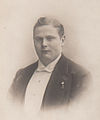
|
Prince Gustav of Denmark | March 4, 1887 | October 5, 1944 | Died unmarried and without children |
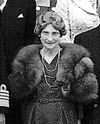
|
Princess Dagmar of Denmark | May 23, 1890 | October 11, 1961 | Married 1922, Jørgen Castenskjold (1893–1978) and had 5 children:
|
Children of Alexandra and Edward VII
In 1861, Princess Alexandra met the future King Edward VII of the United Kingdom at the Speyer Cathedral in Germany. Edward was the eldest son of Queen Victoria and Prince Albert.[14] Edward later proposed to Alexandra in 1862, and they married in 1863 at St George's Chapel at Windsor Castle.[14][9]
Although Alexandra and Edward got along fairly well,[15] Edward engaged in several affairs during their marriage.[9] However, for the most part, Alexandra did not pay attention to her husband's romantic liaisons.[15]
Together, Alexandra and Edward had six children.[9] One of these children, Alexander John, died in infancy.[16] Furthermore, Alexandra and Edward's eldest son, Albert Victor, died in 1892 after contracting an illness during a flu pandemic. Albert Victor's passing devastated Alexandra.[9]
The three daughters of Edward and Alexandra, Louise, Victoria, and Maud, were known for being active during their youth. As the daughters aged, they became more withdrawn. Alexandra did not want Louise, Victoria, and Maud to marry because her daughters had two brothers who could potentially follow Edward to the British throne. However, both Louise and Maud eventually married.[16]
| Portrait of Queen Alexandra and King Edward VII's family |
|---|
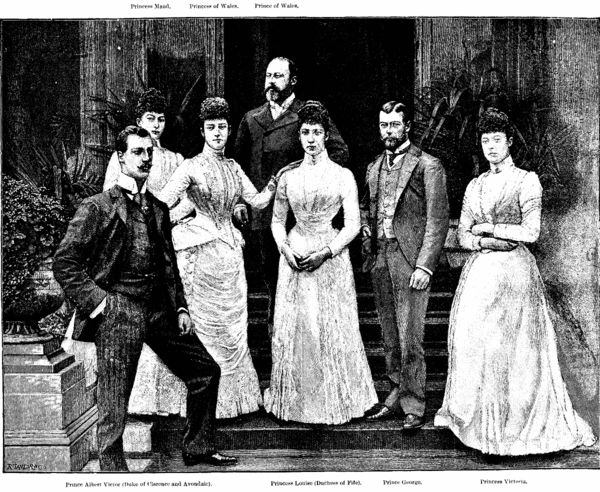 |
| Portrait | Name | Birth | Death | Spouse and children |
|---|---|---|---|---|

|
Prince Albert Victor, Duke of Clarence and Avondale | January 8, 1864 | January 14, 1892 | Died unmarried and without children |
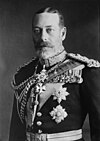
|
George V, King of the United Kingdom r. 1910–1936 | June 3, 1865 | January 20, 1936 | Married 1893, Princess Victoria Mary of Teck (1867–1953) and had 6 children:
|

|
Louise, Princess Royal | February 20, 1867 | January 4, 1931 | Married 1889, Alexander Duff, 1st Duke of Fife (1849–1912) and had 3 children:
|

|
Princess Victoria of the United Kingdom | July 6, 1868 | December 3, 1935 | Died unmarried and without children |

|
Princess Maud of Wales | November 26, 1869 | November 20, 1938 | Married 1896, Haakon VII, King of Norway (1872–1957; r. 1905–1957) and had 1 child:
|

|
Prince Alexander John of Wales | April 6, 1871 | April 7, 1871 | Died unmarried and without children |
Children of George I and Olga
In 1863, the Kingdom of Greece was without a monarch. The royal houses of Europe believed that George I, then Prince William of Denmark, would be a suitable candidate for the Greek throne. Consequently, George traveled to Greece, a country that he had never visited before, that same year to start his reign.[10]
After arriving in Greece, George married Grand Duchess Olga Constantinovna of Russia in 1867. George and Olga had seven children together.[10][b]
| Portrait of King George I and Queen Olga's family |
|---|
 Front row, from left to right: Grand Duchess Maria Georgievna of Russia, Olga, Queen of the Hellenes, Prince Andrew of Greece and Denmark, and George I, King of the Hellenes |
Children of Dagmar and Alexander III
Queen Louise, Dagmar's mother, hoped to find a suitable husband for her daughter in the Russian imperial court. Following the marriage of Dagmar's sister Alexandra, Queen Louise dedicated her enthusiasm into making these hopes a reality. Eventually, in 1864, Dagmar became engaged to Nicholas Alexandrovich, the then-heir to the Russian throne. However, Nicholas died only one year later.[4]
While on his deathbed, Nicholas insisted that his brother, the future Emperor Alexander III of Russia, marry Dagmar.[17] Dagmar gradually developed a romantic attraction toward Alexander.[4] They then married in October 1866,[4] and Dagmar took the name "Maria Feodorovna" after converting to Russian Orthodoxy.[4][17]
Maria and Alexander would go on to have six children together, one of whom, Alexander, did not survive past infancy.[4] Maria adored and spoiled her surviving children, especially the future Emperor Nicholas II of Russia.[4] Likewise, Alexander adored his daughters.[17]
Of the five children of Maria and Alexander that survived past infancy, George died of tuberculosis. Moreover, both Nicholas and Michael, along with Nicholas's five children, were killed during the Russian Revolution.[4]
| Portrait of Emperor Alexander III and Empress Maria's family |
|---|
 Front row, from left to right: Grand Duke Michael Alexandrovich of Russia, Alexander III, Emperor of Russia, Grand Duchess Olga Alexandrovna of Russia, and Grand Duke George Alexandrovich of Russia |
Children of Thyra and Ernest Augustus
Finding a suitable husband for Princess Thyra of Denmark was an undertaking for her mother, Queen Louise. However, Louise had one potential suitor in mind for Thyra: Prince Ernest Augustus, Duke of Cumberland. Eventually, Thyra married Ernest Augustus, which gave her the desired opportunity to have children.[6]
Together, Thyra and Ernest Augustus had six children.[a] Living in Gmunden, Thyra enjoyed a quiet life which allowed her to spend time with her children. However, two of her sons died at a young age. Namely, Prince George passed away in a car accident on the way to the funeral of King Frederick VIII of Denmark. In addition, Prince Christian died of appendicitis.[6]
| Portrait of Crown Princess Thyra and Crown Prince Ernest Augustus's family |
|---|
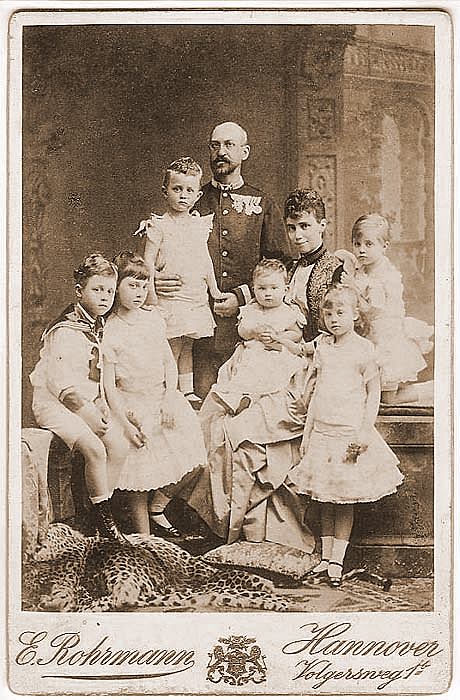 |
| Portrait | Name | Birth | Death | Spouse and children |
|---|---|---|---|---|

|
Princess Marie Louise of Hanover and Cumberland | October 11, 1879[30][31] | January 31, 1948[31] | Married 1900, Prince Maximilian of Baden[32] (1867–1929[32]) and had 2 children:
|

|
Prince George William of Hanover and Cumberland | October 28, 1880[30] | May 20, 1912[34] | Died unmarried and without children |

|
Princess Alexandra of Hanover and Cumberland | September 29, 1882[35] | August 30, 1963[35] | Married 1904, Frederick Francis IV, Grand Duke of Mecklenburg-Schwerin (1882–1945[36]; r. 1897–1918[36]) and had 5 children:
|

|
Princess Olga of Hanover and Cumberland | July 11, 1884[30][37] | September 21, 1958[37] | Died unmarried and without children |

|
Prince Christian of Hanover and Cumberland | July 4, 1885[38] | September 3, 1901[38] | Died unmarried and without children |

|
Ernest Augustus, Duke of Brunswick r. 1913–1918 | November 17, 1887[30][39] | January 30, 1953[39] | Married 1913, Princess Victoria Louise of Prussia (1892–1980) and had 5 children:[39]
|
Children of Valdemar and Marie
In 1885, Prince Valdemar of Denmark married Marie of Orléans, a French princess. Together, they had five children who were nicknamed the "naughty children from the Yellow Palace". Nevertheless, both Valdemar and Marie were very popular in Denmark.[11]
Because of Valdemar's interest in ships, he went on long sea voyages, a practice that continued during his marriage to Marie.[11]
| Portrait | Name | Birth | Death | Spouse and children |
|---|---|---|---|---|

|
Prince Aage of Denmark | June 10, 1887 | February 19, 1940 | Married 1914, Mathilde Calvi dei conti di Bergolo (1885–1949) and had 1 child:
|

|
Prince Axel of Denmark | August 12, 1888 | July 14, 1964[46] | Married 1919, Princess Margaretha of Sweden[46] (1899–1977) and had 2 children:[46]
|

|
Prince Erik of Denmark | November 8, 1890 | September 11, 1950[47] | Married 1924, Lois Frances Booth[47] (1897–1941) and had 2 children:[48]
¶ Erik and Lois's marriage ended in 1937.[49] |

|
Prince Viggo of Denmark | December 25, 1893 | January 4, 1970[50] | Married 1924, Eleanor Margaret Green[50] (1895–1966[50]) and had no children[50] |

|
Princess Margaret of Denmark | September 17, 1895 | September 18, 1992 | Married 1921, Prince René of Bourbon-Parma (1894–1962) and had 4 children:
|
See also
- John William Friso - Another European prince with descendants in multiple royal families
- Louis IX, Landgrave of Hesse-Darmstadt - Most recent common ancestor of all current hereditary European monarchs
- Descendants of Miguel I of Portugal - Describes progeny of another European king whose descendants married into multiple royal families
- Nicholas I of Montenegro - Another European king whose descendants married into multiple royal families
- Descendants of Queen Victoria - Describes progeny of one of Christian IX's contemporaries
Notes
Citations
- ^ a b c d "Christian IX". Royal Palaces. National Museum of Denmark. Retrieved March 6, 2024.
- ^ a b c "Christian IX". Amalienborg Palace. Retrieved March 6, 2024.
- ^ a b c d "Queen Louise". Amalienborg Palace. Retrieved March 7, 2024.
- ^ a b c d e f g h i Beeche, Art. "Dowager Empress Marie". Alexander Palace Time Machine. Bob Atchinson. Retrieved March 11, 2024.
- ^ "The History of Denmark 1875-1900". Amalienborg Palace. Retrieved March 11, 2024.
- ^ a b c d "Thyra". Amalienborg Palace. Retrieved March 11, 2024.
- ^ a b c d e "Frederik VIII 1906-1912". Amalienborg Palace. Retrieved March 11, 2024.
- ^ Rodriguez & Warner 2019, Princess Thyra of Denmark.
- ^ a b c d e Prahl, Amanda. "Biography of Queen Alexandra". ThoughtCo. Dotdash. Retrieved March 12, 2024.
- ^ a b c "Vilhelm (George I)". Amalienborg Palace. Retrieved March 12, 2024.
- ^ a b c "Valdemar". Amalienborg Palace. Retrieved March 12, 2024.
- ^ a b "Queen Lovisa of Denmark". Swedish Royal Court. Retrieved March 17, 2024.
- ^ a b c d e f "Queen Lovisa". Amalienborg Palace. Retrieved March 17, 2024.
- ^ a b "Edward VII (r.1901-1910)". The Royal Family. Royal Household at Buckingham Palace. Retrieved March 17, 2024.
- ^ a b Prahl, Amanda. "Biography of Edward VII, Successor to Queen Victoria". ThoughtCo. Dotdash. Retrieved March 17, 2024.
- ^ a b Lewis, Jone Johnson. "The Princess Louise, Princess Royal and Duchess of Fife". ThoughtCo. Dotdash. Retrieved March 17, 2024.
- ^ a b c Malsom, Scott. "Alexander III". Alexander Palace Time Machine. Bob Atchinson. Retrieved March 16, 2024.
- ^ a b Salmond, Nick. "Royal Family Tree: Alexander Alexandrovich of Russia". Royal Family Tree. Retrieved April 10, 2024.
- ^ a b Salmond, Nick. "Royal Family Tree: George Alexandrovich of Russia". Royal Family Tree. Retrieved April 10, 2024.
- ^ a b c Spary, Emily (April 6, 2017). "A ROYAL RUSSIAN RESIDENT: GRAND DUCHESS XENIA ROMANOV AT HAMPTON COURT PALACE". Historic Royal Palaces. Retrieved April 10, 2024.
- ^ a b c d e f g h Latsio, Irina; Bagrova, Margarita (April 5, 2024). "Emigration of the Romanovs to Great Britain: the story of Grand Duchess Xenia". Afisha.London. Retrieved April 10, 2024.
- ^ Lacio, Irina. "Felix Yusupov and Princess Irina of Russia: love, riches and emigration". Afisha.London. Retrieved April 10, 2024.
- ^ a b c d e "The Russian Imperial House: A Historical Survey". Russian Imperial House. AAZ. Retrieved April 10, 2024.
- ^ "Vasili Romanov, 81, Nephew of Last Czar". The New York Times. June 28, 1989. p. 21. Retrieved April 10, 2024.
- ^ a b Salmond, Nick. "Royal Family Tree: Michael Alexandrovich of Russia". Royal Family Tree. Retrieved April 10, 2024.
- ^ a b "Brasova Collection". UCL Library Services. University College London. Retrieved April 10, 2024.
- ^ Davidson, Lisa. "Grand Duke Mikhail Alexandrovich". Alexander Palace Time Machine. Bob Atchinson. Retrieved April 10, 2024.
- ^ a b c d e f Harris, Carolyn (July 2, 2021). "Grand Duchess Olga". The Canadian Encyclopedia. Historica Canada. Retrieved April 10, 2024.
- ^ "Grand Duchess Olga Alexandrovna". Alexander Palace Time Machine. Bob Atchinson. Retrieved March 12, 2024.
- ^ a b c d "THE ROYAL HOUSE OF HANOVER" (PDF). The Lady's Realm. Hutchinson. n.d. pp. 55–61. Retrieved March 22, 2024 – via VictorianVoices.net.
- ^ a b Salmond, Nick. "Royal Family Tree: Marie Louise of Hanover". Royal Family Tree. Retrieved March 22, 2024.
- ^ a b "PRINCE MAX VON BADEN". The Argus (Melbourne). Berlin. November 7, 1912. p. 8. Retrieved March 22, 2024 – via Trove.
- ^ "Prince Berthold of Baden Dies, 57". St. Cloud Times. Salem, Germany. October 28, 1963. p. 7. Retrieved March 22, 2024 – via Newspaper.com.
- ^ "A PRINCE'S DEATH". The Mercury (Hobart). Berlin. May 21, 1912. p. 5. Retrieved March 22, 2024 – via Trove.
- ^ a b Salmond, Nick. "Royal Family Tree: Alexandra of Hanover". Royal Family Tree. Retrieved March 22, 2024.
- ^ a b c d Corston, Daniel. "History of the House". House of Mecklenburg-Strelitz. Retrieved March 22, 2024.
- ^ a b Salmond, Nick. "Royal Family Tree: Olga of Hanover". Royal Family Tree. Retrieved March 22, 2024.
- ^ a b Salmond, Nick. "Royal Family Tree: Christian of Hanover". Royal Family Tree. Retrieved March 22, 2024.
- ^ a b c Salmond, Nick. "Royal Family Tree: Ernest Augustus". Royal Family Tree. Retrieved March 22, 2024.
- ^ Salmond, Nick. "Royal Family Tree: Ernest Augustus of Hanover". Royal Family Tree. Retrieved March 22, 2024.
- ^ Müller, Norbert (March 2006). "HRH Prince George Wilhelm of Hanover (Obituary)" (PDF). Journal of Olympic History. 14 (1): 65. Retrieved March 22, 2024.
- ^ a b c Saxon, Wolfgang (February 7, 1981). "FREDERIKA, GREEK QUEEN MOTHER; IN MADRID HOSPITAL AS AN EXILE". The New York Times. p. 32. Retrieved March 22, 2024.
- ^ "Greek Royal Family - THANKSGIVING SERVICE FOR THE LIFE OF HIS MAJESTY KING CONSTANTINE OF THE HELLENES". Greek Royal Family. Retrieved March 22, 2024.
- ^ Salmond, Nick. "Royal Family Tree: Christian Oscar of Hanover". Royal Family Tree. Retrieved March 22, 2024.
- ^ Salmond, Nick. "Royal Family Tree: Welf Henry of Hanover". Royal Family Tree. Retrieved March 22, 2024.
- ^ a b c d e "PRINCE AXEL DIES; LED DANISH FIRM; Businessman and Flier Was an Avid Sportsman". The New York Times. Copenhagen, Denmark. July 15, 1964. p. 32. Retrieved March 22, 2024.
- ^ a b "PRINCE ERIK DEAD IN DENMARK AT 59; Cousin of King Christian Gave Up Rights of Succession When He Wed Canadian in 1924". The New York Times. Copenhagen, Denmark. September 12, 1950. p. 27. Retrieved March 22, 2024.
- ^ a b c Powell, James (December 13, 2014). "Ill-Starred Royal Romance". Today in Ottawa's History. WordPress.com. Retrieved March 22, 2024.
- ^ "Milestones, Jul. 26, 1937". TIME. July 26, 1937. Retrieved March 12, 2024.
- ^ a b c d "Prince Viggo, 76, Widower of Peter Cooper Descendant". The New York Times. Ebeltoft, Denmark. January 5, 1970. p. 37. Retrieved March 22, 2024.
- ^ "Prince Killed in Denmark As Car and Truck Collide". The New York Times. Copenhagen, Denmark. November 6, 1964. p. 26. Retrieved March 22, 2024.
- ^ a b Pearl, Diana. "Ambulance Driver, Poultry Farm Worker and Exiled Royal: Inside the Fascinating Life of the Late Queen Anne of Romania". People. Dotdash Meredith. Retrieved March 22, 2024.
- ^ Davison, Phil (August 18, 2018). "Prince Michel of Bourbon-Parma, European royal and Allied paratrooper, dies at 92". The Washington Post. Retrieved March 22, 2024.
References
- Rodriguez, Blanca; Warner, Alex (December 31, 2019). "All the Royals With (Rumored) Illegitimate Children". Marie Claire. Future plc. Retrieved March 12, 2024.





